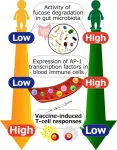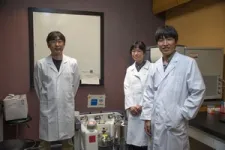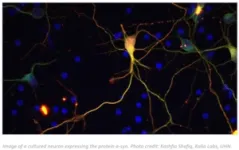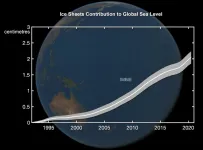(Press-News.org) Gut bacteria that break down a sugar called fucose could be dampening our immune response to the COVID-19 mRNA vaccine, according to a study led by researchers from the Okinawa Institute of Science and Technology (OIST).
The scientists report that increased fucose digestion by bacteria in the gut before vaccination was associated with lower numbers of T-cells activated by vaccination. T-cells are an important type of blood immune cell that are activated by a specific strain of bacteria or virus, and then multiply to fight the infection.
The findings, published 20 April in Communications Biology, illustrate the important impact that the trillions of bacteria in our gut — collectively called our ‘gut microbiome’— have on our immune health and adds a missing piece to the puzzle of why vaccination varies in effectiveness from person to person.
“Not everyone who gets the same vaccine receives an equal level of protection, but we still don’t really understand why people respond so differently,” said Professor Hiroki Ishikawa, who leads the OIST Immune Signal Unit. “If we can get to the bottom of what causes this variation, we could predict how an individual might respond to a vaccine, and perhaps find new strategies to promote the immune response.”
While this research focused on the response to the COVID-19 Pfizer mRNA vaccine, the researchers believe their results could also be relevant for other mRNA vaccines in development that protect against other infectious diseases, and even cancer.
In this study, Prof. Ishikawa and his colleagues took a stool sample and multiple blood samples from 96 healthy participants living in Okinawa, starting before the first dose of the vaccine, and ending a month after the second dose.
They then did a broad analysis, looking at all the genes from immune cells in the blood and bacteria in the gut to see if there was any association with an individual’s T-cell and antibody levels.
The researchers did not find a significant link to antibody levels, but they did find that individuals that had a lower T-cell response also had a gut microbiome with a high activity of fucose digestion.
The team also found that individuals with a reduced T-cell response had higher expression of two genes, FOS and ATF3, prior to vaccination. These genes are expressed by blood immune cells, and code for proteins that are part of a larger group, called AP-1 transcription factors. Previous research has shown that different AP-1 transcription factors control T-cell survival and activity, but the exact role and function of these two proteins remains unknown.
Individuals with higher expression of FOS and ATF3 prior to vaccination also had microbiomes with high activity of fucose digestion, suggesting that the gut’s impact on the immune system is through a pathway that involves FOS and ATF3.
“The mechanism is not yet proven, but we propose that fucose digestion leads to increased baseline expression of FOS and ATF3 in blood immune cells, which in turn weakens the response to the COVID-19 vaccine,” said Masato Hirota, first author and PhD student in the Immune Signal Unit. “It’s clear that the gut bacteria have an important impact on the overall health of the immune system.”
The team now plans to experimentally manipulate the gut bacteria in mice and investigate the exact mechanism of FOS and ATF3, to further understand the link between the microbiome, blood immune cells and the overall immune response.
The study was carried out as a collaboration between the OIST, Naha Medical Association and KIN Oncology Wellness Clinic. From OIST, Prof. Hiroaki Kitano, Prof. Matthias Wolf, and former Provost Mary Collins contributed to the study. This was supported by COVID-19 AI and Simulation Project (Cabinet Secretariat) to Prof. Ishikawa, the Platform Project for Supporting Drug Discovery and Life Science Research (BINDS) from AMED to Prof. Wolf, and JST COI-NEXT to Prof. Kitano.
END
Gut bacteria could be behind weaker immune responses to COVID-19 vaccine
Digestion of fucose sugar by bacteria in our digestive tract could be hampering how effectively we respond to the COVID-19 mRNA vaccine.
2023-04-20
ELSE PRESS RELEASES FROM THIS DATE:
Swedish quantum computer applied to chemistry for the first time
2023-04-20
There are high expectations that quantum computers may deliver revolutionary new possibilities for simulating chemical processes. This could have a major impact on everything from the development of new pharmaceuticals to new materials. Researchers at Chalmers University have now, for the first time in Sweden, used a quantum computer to undertake calculations within a real-life case in chemistry.
“Quantum computers could in theory be used to handle cases where electrons and atomic nuclei move in more complicated ways. If we can learn to utilise their full potential, we should be able to advance the boundaries of what is possible to calculate and understand,” says Martin Rahm, ...
Polar ice sheet melting records have toppled during the past decade
2023-04-20
The seven worst years for polar ice sheets melting and losing ice have occurred during the past decade, according to new research, with 2019 being the worst year on record.
The melting ice sheets now account for a quarter of all sea level rise – a fivefold increase since the 1990’s – according to IMBIE, an international team of researchers who have combined 50 satellite surveys of Antarctica and Greenland taken between 1992 and 2020.
Their findings are published today in the journal Earth System Science Data.
Global heating is melting ...
Companies’ zero-deforestation commitments have potential to halve cattle-driven deforestation in Brazilian Amazon
2023-04-20
Cattle-rearing is the biggest cause of tropical deforestation in the Amazon - and the world.
A study has found that some of the world’s largest slaughterhouses reduced cattle-driven deforestation in the Amazon by 15% - equivalent to sparing 7,000km2 of forest from clearance (4.5 times the size of London) - through their commitment to zero-deforestation policies between 2010 and 2018.
If these policies were fully implemented and adopted across all cattle companies operating in the Amazon, 24,000km2 of forest (an area larger than Wales) could have been spared over this time, effectively halving cattle-driven deforestation in Brazil.
Deforestation ...
Exposure to air pollution during pregnancy increases risk for flu
2023-04-20
During pregnancy, women are more susceptible to severe respiratory infections from multiple viruses, including influenza A virus (IAV), respiratory syncytial virus (RSV) and severe acute respiratory syndrome coronavirus (SARS-CoV-2). Additionally, pregnant women are disproportionately affected by influenza, resulting in a more than 10-fold increase in hospitalization risk.
A new study led by Dr. Natalie Johnson, associate professor in the Texas A&M University School of Public Health’s Department of Environmental and Occupational Health, shows that exposure to ultrafine particles (UFPs) during pregnancy enhances respiratory ...
Trim the sugar: New HIV vaccine design improves immune response
2023-04-20
LA JOLLA, CA— A new HIV vaccine from Scripps Research has shown a significantly improved ability to neutralize the virus in preclinical tests, and it will soon be studied in healthy people who volunteer to participate in clinical trials.
The new and unique vaccine design, described in a paper in Nature Communications on April 9, 2023, uses tiny protein “nanoparticles” to display multiple copies of HIV’s surface protein Env, thus presenting itself to the immune system much as real HIV particles would ...
Immediate carbon cuts, common marine heatwave terminology urged
2023-04-20
Over the past two hundred years, the ocean and atmosphere have been accumulating massive amounts of carbon dioxide as factories, automobiles, airplanes, and more churn out the powerful greenhouse gas. Two articles published recently in Nature by University of Hawai‘i at Mānoa oceanographers provide a reality check on the limitations of carbon dioxide removal and a warning that marine heatwaves need clear definitions so communities can adapt.
Carbon dioxide removal is not the golden ticket
In all the scenarios assessed by the Intergovernmental Panel on Climate Change, nations around the world must dramatically and rapidly reduce their dependence ...
Paul Hessburg receives Distinguished Landscape Ecologist Award
2023-04-20
Paul Hessburg received the International Association for Landscape Ecology-North America Chapter’s 2023 Distinguished Landscape Ecologist Award. The annual award recognizes major scientific contributions to landscape ecology, honors scientists who have played a pivotal role in shaping the field, and is the organization’s highest honor.
Hessburg is a senior research ecologist with the USDA Forest Service's Pacific Northwest Research Station based at the Wenatchee Forestry Sciences Laboratory. He was honored for a highly diverse career that has "greatly enhanced the capacity of landscape practitioners to develop strategies and ...
Cut council tax for green gardeners to help cities tackle climate change
2023-04-20
Homeowners should be rewarded to garden sustainably, new research by Professor of Environmental Horticulture at University of Sheffield, recommends
Rewards for sustainable gardening could include reductions to council tax, water bills or assistance with resources
Ensuring urban gardeners have the ability to have planted gardens will have numerous benefits for the environment and communities
Banning environmentally damaging materials, such as pesticides; or practices such as installing astroturf, could also benefit the environment
Research shows that some cities may have lost as much as 50 per cent of their green garden space over the last ...
Online tool found to be effective at assessing dementia risk
2023-04-20
Researchers at UNSW Sydney and Neuroscience Research Australia (NeuRA) have developed and evaluated a tool for assessing dementia risk, with promising initial results.
Currently, over 55 million people are living with dementia around the world, with that number set to increase to 78 million by 2030, and the focus on dementia research increasingly shifting towards prevention.
The online tool takes approximately 20 minutes to complete and provides a personalised dementia risk report that patients can discuss with their doctor.
Since developing the risk tool – known as CogDRisk – in 2022, the team has been evaluating the success of the tool, by trialling it on four existing datasets, ...
A myth no more: Cranberry products can prevent urinary tract infections for women
2023-04-20
Drinking cranberry juice has long been a mythical prevention strategy for women who develop a urinary tract infection – and new medical evidence shows consuming cranberry products is an effective way to prevent a UTI before it gets started.
A global study looking at the benefits of cranberry products published in Cochrane Reviews has determined cranberry juice, and its supplements, reduce the risk of repeat symptomatic UTIs in women by more than a quarter, in children by more than half, and in people susceptible to UTI following medical interventions by about ...
LAST 30 PRESS RELEASES:
A genetic brake that forms our muscles
CHEST announces first class of certified critical care advanced practice providers awarded CCAPP Designation
Jeonbuk National University researchers develop an innovative prussian-blue based electrode for effective and efficient cesium removal
Self-organization of cell-sized chiral rotating actin rings driven by a chiral myosin
Report: US history polarizes generations, but has potential to unite
Tiny bubbles, big breakthrough: Cracking cancer’s “fortress”
A biological material that becomes stronger when wet could replace plastics
Glacial feast: Seals caught closer to glaciers had fuller stomachs
Get the picture? High-tech, low-cost lens focuses on global consumer markets
Antimicrobial resistance in foodborne bacteria remains a public health concern in Europe
Safer batteries for storing energy at massive scale
How can you rescue a “kidnapped” robot? A new AI system helps the robot regain its sense of location in dynamic, ever-changing environments
Brainwaves of mothers and children synchronize when playing together – even in an acquired language
A holiday to better recovery
Cal Poly’s fifth Climate Solutions Now conference to take place Feb. 23-27
Mask-wearing during COVID-19 linked to reduced air pollution–triggered heart attack risk in Japan
Achieving cross-coupling reactions of fatty amide reduction radicals via iridium-photorelay catalysis and other strategies
Shorter may be sweeter: Study finds 15-second health ads can curb junk food cravings
Family relationships identified in Stone Age graves on Gotland
Effectiveness of exercise to ease osteoarthritis symptoms likely minimal and transient
Cost of copper must rise double to meet basic copper needs
A gel for wounds that won’t heal
Iron, carbon, and the art of toxic cleanup
Organic soil amendments work together to help sandy soils hold water longer, study finds
Hidden carbon in mangrove soils may play a larger role in climate regulation than previously thought
Weight-loss wonder pills prompt scrutiny of key ingredient
Nonprofit leader Diane Dodge to receive 2026 Penn Nursing Renfield Foundation Award for Global Women’s Health
Maternal smoking during pregnancy may be linked to higher blood pressure in children, NIH study finds
New Lund model aims to shorten the path to life-saving cell and gene therapies
Researchers create ultra-stretchable, liquid-repellent materials via laser ablation
[Press-News.org] Gut bacteria could be behind weaker immune responses to COVID-19 vaccineDigestion of fucose sugar by bacteria in our digestive tract could be hampering how effectively we respond to the COVID-19 mRNA vaccine.






